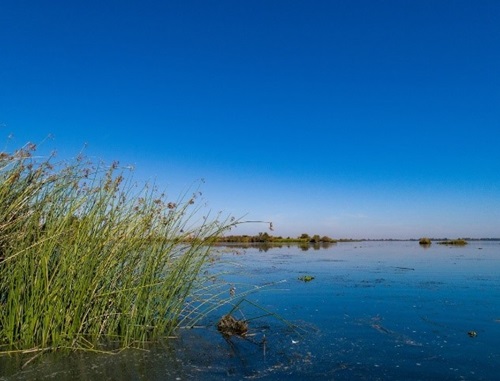Tribal Engagement

A picture of tidal wetlands in the Yolo Bypass, with tule rush and water.
The Central Valley Flood Protection Plan covers lands within the Sacramento and San Joaquin Valley watersheds. This large geographical area includes the ancestral territories of numerous California Native American Tribes.
DWR is committed to open, inclusive, and regular communication with Tribal governments consistent with California Executive Orders B-10-11 and N-15-19, acknowledging California Tribes have the inherent right to exercise sovereignty over their members and territory. Tribes and Tribal communities have a unique relationship with water and the greater ecological landscape of their ancestral homelands including considerations for the environment, economy, and culture that supports the health and wellness of their members, residents and surrounding community. Tribes and Tribal communities reside throughout the state and exercise their deep connections to water and water-related resources.
The CVFPP process aims to incorporate the interests, needs, and concerns of Tribes culturally and traditionally affiliated with the CVFPP planning area.
DWR Tribal Engagement – Central Valley Flood Protection Plan: 2012 to Present
Below is a record of DWR CVFPP Tribal engagement activities for each five-year update of the CVFPP.
DWR will conduct government-to-government consultation with all Tribal governments that request consultation with DWR pursuant to applicable laws and policies. To protect confidentiality, DWR will not disclose any sensitive information shared during consultation.
An overview of various informational meetings and general correspondence with Tribal representatives are listed below with links to presentations and other materials.
- April 21, 2022: The 2022 CVFPP Update Public Draft was released for review and comment. The document and guidance on how to submit comments is available online at: https://water.ca.gov/Programs/Flood-Management/Flood-Planning-and-Studies/Central-Valley-Flood-Protection-Plan. The public review period will close at 5 p.m. on Monday, June 6, 2022. During the public review period, the Central Valley Flood Protection Board (CVFPB) will host a series of public hearings to collect comments. The hearings will be held on: May 12 at 6 p.m. in Stockton at the Robert Cabral Agriculture Center at 2101 E. Earhart Ave; May 16 at 10 a.m. in Sacramento at the State of California Natural Resources Building at 715 P Street; and a virtual hearing will be held on May 19 at 6 p.m. More information on the public hearings is provided at www.cvfpbfloodplanhearings2022.org.
- October 4, 2021: Tribal Informational Meeting
- April 28, 2021: DWR sent notification letters to all Tribes located in the counties within the planning area, at the addresses provided by the Native American Heritage Commission. The project notification letters provided an invitation to consult with DWR under AB 52 and DWR’s Tribal Engagement Policy.
- March 2, 2021: Pre-AB 52 Tribal Informational Meeting
- February 16, 2021: Pre-AB 52 Tribal Informational Meeting
- March 18, 2016: DWR sent notification letters to all Tribes located in the counties within the planning area, at the addresses provided by the Native American Heritage Commission. The project notification letters provided an invitation to consult with DWR under AB 52 and DWR’s Tribal Engagement Policy.
The 2012 CVFPP public review process was completed prior to the implementation of State policies for Tribal consultation, such as the California Natural Resources Agency’s Tribal Consultation Policy (2012), DWR’s Tribal Engagement Policy (2016), or AB 52 (2014). However, outreach conducted for the CVFPP included presentations to various Tribal associations, such as the CA Rural Indian Health Board, the USEPA’s Regional Tribal Operations Committee, and the CA Indian Basket Weavers. The 2012 CVFPP Program Environmental Impact Report included an analysis of potential adverse impacts on cultural and historic resources, and potential mitigation measures that could be incorporated on a project level.
Tribal Contact
For Tribes, more information on the CVFPP or DWR Tribal engagement processes, please contact DWR’s Tribal Affairs Office and Tribal Advisor, Anecita Agustinez, at:
Email:
Phone: (916) 653-8726
